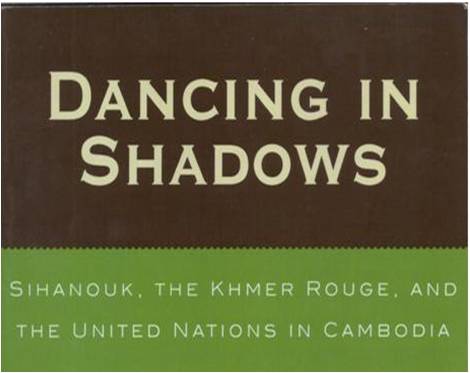Dr. Benny Widyono was born
 B
B Benny is thus an excellent guide to post-colonial Cambodia. As a recipient of the title of Commandeur de L'Ordre Royal de Sahametrey in 2004, the highest title for civilians bestowed by H.M. King Sihanouk of Cambodia, Benny played an integral role working with the U.N. in the recovery from the death and destruction of Pol Pot in a way that a non-South East Asian could have. Another key player at the time was the Japanese head of United Nations in Cambodia, Yasushi Akashi.
Benny notes in his book the King's words to the Japanese head of the U.N. presence in Cambodia:
"I wish to thank you, Excellency Mr. Yasushi Akashi, for sending another prince from Java to help bring peace to Cambodia," quipped Norodom Sihanouk, the King of Cambodia, referring to me.Benny's life is fascinating because he was raised in Indonesia in a minority religion - Roman Catholicism - and yet he attended the most prestigious university there, the University of Indonesia in Jakarta. He went on to study economics in the University of Texas. His Ph.D. dissertation compared the role of petroleum in economic development in Mexico and Indonesia. One week after he graduated he was offered a position with the United Nations in Thailand, beginning his professional and personal odyssey.
We were at the official inauguration of my office, the provincial headquarters of the U.N. Transitional Authority on Cambodia (UNTAC) in Siemreap, Cambodia in 1992, the U.N. Peacekeeping operation established to bring peace to Cambodia.
Prior to our arrival, Cambodia was, due to its political location, been for 20 years the subject of turmoil, civil war and Khmer Rouge induced genocide. To end the stalemate of Cambodia having two governments... the U.N. became the temporary government until elections could be held.
Yasushi Akashi was the head of UNTAC and therefore, temporarily, the head of the country. I was his "governor" of Siemreap Province, home of the world famous Angkor Wat temple.
In 1981, Benny was transferred back to New York to work on helping countries cope with multinational corporations. In his new capacity he writes of coming home late from New York City as now his work at the U.N. consisted of "going to endless cocktail parties to lobby with ambassadors and other diplomats of member states. Most of the work gets done in these parties."
At the U.N. cocktail parties, he notes ruefully, the poorer the country the more lavish its reception:
One day Ethiopia celebrated its tenth anniversary of the Marxist revolution in that country with unlimited shrimps and other delicacies and whiskey and wine flowing all evening while we see pictures on BBC TV of starving Ethiopians looking like corpses.It is this encounter with the Khmer Rouge ambassador, plus his experiences in Thailand where he had witnessed Cambodian refugees escape the Khmer Rouge atrocities and appear -- one by one -- from the jungle like emaciated corpses. These survivors reminded him of those in Ethiopia which made me decide to volunteer for Cambodian service for the U.N. I wrote about such survivors such as my good friend Ambassador Sichan Siv, whose story I have also told.
Another anomaly was that the Khmer Rouge ambassador, who was responsible for killing 1.7 million of its own people, would strut about shaking hands with everybody to lobby against that bad fellow Hun Sen, Prime Minister of Cambodia who de facto ruled the country since 1979, because the U.S. and China spearheaded a resolution in the U.N. to continue to recognize the Khmer Rouge instead of the People's Republic of Kampuchea.